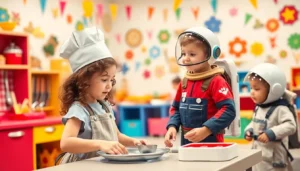Table of Contents
ToggleIn a world where kids are often glued to screens, early childhood play-based learning emerges as a breath of fresh air. Imagine a classroom where children don’t just sit and listen but dive headfirst into adventures filled with laughter, creativity, and discovery. It’s not just play; it’s the secret sauce for developing critical thinking and social skills.
Research shows that when kids engage in play, they’re not just having fun—they’re building the foundation for lifelong learning. Picture tiny hands crafting masterpieces, little feet racing to solve problems, and giggles echoing as they collaborate with friends. This approach transforms the learning experience into a joyful journey, making education feel less like a chore and more like an exciting quest. So, why settle for boring when you can embrace the magic of play?
Understanding Early Childhood Play Based Learning
Early childhood play-based learning focuses on children’s natural inclination to explore and create through play. This method nurtures comprehensive development, allowing young learners to thrive socially, emotionally, and academically.
Definition and Importance
Play-based learning refers to an educational approach that utilizes play as the primary vehicle for learning in early childhood. This method emphasizes experiences that allow children to engage actively with their surroundings. Importance lies in its ability to foster critical thinking, problem-solving, and collaboration. Children engage wholeheartedly in meaningful activities, leading to increased motivation and retention of knowledge. Research from the National Association for the Education of Young Children showcases that play promotes cognitive growth and emotional intelligence, making it essential for early development.
Key Components
Key components of play-based learning include child-led activities, social interaction, and a stimulating environment. Child-led activities encourage autonomy, allowing children to make choices and express creativity. Social interaction cultivates communication skills and teamwork, essential for navigating relationships. A stimulating environment incorporates diverse materials and experiences that enhance exploration and curiosity. Notably, incorporating different types of play—imaginative, constructive, and physical—further supports holistic learning. Ultimately, these elements work in unison to provide a rich foundation for lifelong learning.
Benefits of Early Childhood Play Based Learning
Early childhood play-based learning offers significant advantages for children’s overall development. This approach nurtures various aspects, including cognitive development and social skills enhancement.
Cognitive Development
Cognitive growth emerges as children engage in imaginative play. They develop problem-solving skills through exploration and experimentation. Activities like building with blocks or role-playing scenarios stimulate critical thinking. Research indicates that these experiences enhance memory retention and information processing. Children’s natural curiosity drives their learning, leading to deeper understanding. Each engaging activity reinforces their ability to make connections between concepts. Skills acquired during play lay the groundwork for future academic success.
Social Skills Enhancement
Social skills flourish in play-based environments. Collaborative play encourages children to communicate, negotiate, and resolve conflicts. Sharing toys or taking turns during games teaches empathy and cooperation. Children learn to recognize emotions in themselves and others, cultivating emotional intelligence. Engaging with peers through group activities promotes teamwork and builds friendships. Play settings provide opportunities for children to express themselves openly. These interactions create a sense of belonging and community, which is crucial for personal development. Ultimately, play acts as a powerful medium for enhancing social capabilities during early childhood.
Approaches to Implementing Play Based Learning
Implementing play-based learning involves various approaches that cater to children’s natural learning styles. These approaches include structured play and free play, each contributing uniquely to a child’s development.
Structured Play
Structured play offers a guided framework where activities follow specific goals and objectives. Educators design these activities to target particular skills such as teamwork and problem-solving. For example, group building projects facilitate collaboration among children. This structured approach also incorporates routines, helping children understand expectations, which enhances their focus and engagement during play. Teachers observe interactions to provide feedback and support, adjusting activities based on children’s responses. Overall, structured play promotes intentional learning while maintaining the joy of play.
Free Play
Free play encourages children to explore and use their imagination without specific constraints. In this environment, kids choose their activities, fostering creativity and independence. They might engage in role-playing scenarios or invent their games, allowing for personal expression. Through free play, children develop critical thinking skills and learn to navigate social situations. Opting for peer-led interactions enhances communication and negotiation abilities. By providing diverse materials and open spaces for exploration, caregivers promote an enriching atmosphere for learning. Such opportunities lead to deeper cognitive and emotional growth, laying a solid foundation for future learning experiences.
Challenges in Early Childhood Play Based Learning
Early childhood play-based learning encounters several challenges that can impact its effectiveness. These challenges primarily include resource limitations and educator training.
Resource Limitations
Funding shortages often restrict access to necessary materials and facilities. Many early childhood programs lack toys, art supplies, and safe spaces for play, directly affecting the quality of play experiences. Insufficient access to resources can lead to a less stimulating environment, hindering children’s engagement. Moreover, limited availability of diverse play materials constrains opportunities for imaginative play, reducing cognitive and social skill development. Communities often need strategic planning to allocate sufficient resources to play-based learning initiatives.
Educator Training
Insufficient training for educators poses a significant hurdle in implementing play-based learning. Many educators lack knowledge about the principles and practices of play-based approaches. Consequently, they may struggle to facilitate effective learning experiences that align with children’s developmental needs. Professional development opportunities play a crucial role in equipping educators with the necessary skills. Training programs should focus on promoting understanding of play’s importance and providing strategies for intentional teaching within play settings. Comprehensive training ensures educators can create engaging, child-centered learning experiences that support holistic development.
Embracing early childhood play-based learning is crucial for fostering essential skills in young children. This approach not only nurtures cognitive and social development but also instills a love for learning that lasts a lifetime. By prioritizing play as a fundamental aspect of education, caregivers and educators can create enriching environments that encourage exploration and creativity.
Addressing challenges such as resource limitations and the need for educator training is vital to fully realize the benefits of this learning method. Investing in professional development and adequate materials will empower educators to facilitate engaging play experiences. Ultimately, the commitment to play-based learning lays a strong foundation for children’s future success, equipping them with the skills they need to thrive in an ever-changing world.










